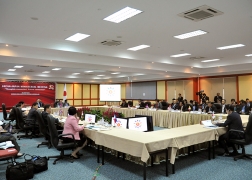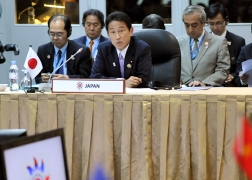Countries & Regions
Japan-ASEAN Ministerial Meeting (Overview)
June 30, 2013


Opening Remarks
Foreign Minister Fumio Kishida opened his remarks by expressing his appreciation to Brunei Darussalam and Cambodia for their efforts in holding the meeting.
He stressed that the importance of ASEAN has become increasingly great, and the relationship between Japan and ASEAN as well as the bilateral relations between Japan and each ASEAN Member State play an extremely significant part in Japan’s diplomacy.
From such point of view, the Minister reminded that Prime Minister Abe, Deputy Prime Minister/Finance Minister Aso as well as himself chose ASEAN Member States as their first overseas visits after assuming their posts. Minister Kishida noted that Prime Minister Abe announced the “Five Principles of Japan’s ASEAN Diplomacy” during his stay in Jakarta last January, and that he himself is making efforts in strengthening ASEAN-Japan relationship in various fields including politics/security, economy, culture and people-to-people exchange based on the Five Principles.
He also announced that Japan will host the ASEAN-Japan Commemorative Summit to celebrate the 40th Anniversary of ASEAN-Japan Friendship and Cooperation in Tokyo from the 13th to 15th of December of this year. He expressed his hope that during the Summit, the leaders will discuss a medium and long term vision towards strengthening ASEAN-Japan relations, and promote the 40th Anniversary catchphrase of “Thoughts Connected, Future Connected.”
ASEAN-Japan Relations
Foreign Minister Kishida updated the other ministers on the preparation for the ASEAN-Japan Commemorative Summit and the 40th Anniversary of ASEAN-Japan Friendship and Cooperation, noting that over 300 events in Japan and ASEAN have already been registered this year and that more will come. He hoped that exchange between Japan and ASEAN will be further enhanced through these events.
At the same time, the Minister mentioned that Japan is putting importance in strengthening ASEAN Connectivity in its assistance towards the establishment of the ASEAN Community, steadily implementing the Flagship Projects which combines 33 major projects. He stated that there have been concrete results such as the Feasibility Study on the Roll-on/Roll-off (Ro/Ro) Network and Short-sea shipping which was successfully concluded, and the Cai Mep Terminal project which will be completed this autumn. He looked forward to further cooperating with ASEAN in order to narrow the development gaps and achieve a balanced development within ASEAN by organically coordinating with the assistance programs on Institutional Connectivity conducted by JICA experts.
Disaster Management
Foreign Minister Kishida addressed that for the ASEAN region, where natural disasters often occur, appropriate capacity building on disaster management is essential for the establishment of the ASEAN Community. He introduced that Japan announced the concept of the ASEAN Disaster Management Network and have been assisting in the capacity building of the ASEAN Coordinating Centre for Humanitarian Assistance on disaster management (AHA Centre) as well as in linking the AHA Centre with disaster prevention authorities of ASEAN Member States. Furthermore, he added that, last year, Japan had newly assisted in the development of a disaster emergency logistic system for ASEAN. The Minister expressed his delight that the system was utilized straightaway, being able to provide stock supplies to Myanmar, the Philippines among others during disasters, and hoped to further make tangible progress based on the aforementioned concept.
Youth Exchange
Foreign Minister Kishida expressed that in order to further strengthen the bond between Japan and ASEAN, exchange among youths, who will be the foundation of future Japan-ASEAN relationship, would be extremely important. He stated that to celebrate the 40th Anniversary, Japan has begun JENESYS 2.0 and will exchange approximately 10,000 youths with ASEAN Member States. He noted that he looked forward to an even more robust relationship through the friendship that would be fostered between the youths of Japan and ASEAN.
RCEP
With the commencement of the negotiations on the Regional Comprehensive Economic Partnership (RCEP) this year, Foreign Minister Kishida expressed his wish to coordinate well with ASEAN to achieve a comprehensive and high-quality RCEP Agreement.
New Cooperative Areas with ASEAN
Foreign Minister Kishida introduced some examples of areas of cooperation with ASEAN that was included in the recently formulated “Japan Revitalization Strategy -Japan is Back-” as the third arrow of “Abenomics”.
(1) Cooperation in Outer Space
In the field of outer space, beyond the ongoing cooperation in the area of disaster prevention, Japan hopes to forge a comprehensive cooperative relationship with ASEAN. Japan would like to further move forward in considering the expansion of cooperation in outer space in such areas as collaborative operation of Earth observatory satellites and satellite positioning.
(2) Global Promotion on Health and Strategy on Global Health Diplomacy
Japan recently proposed its “Strategy on Global Health Diplomacy,” prioritizing global health in its foreign policy, and promoting universal health coverage. As one example, Japan would like to cooperate with ASEAN in the field of preventive care.
(3) East Asia Low Carbon Growth Partnership Dialogue, Joint Crediting Mechanism
Regarding measures against climate change, the Second East Asia Low Carbon Growth Partnership Dialogue was held on May 18th 2013 in Tokyo under the co-chair of Cambodia and Japan, with discussions focusing on “technology” that contributes to low carbon growth. Japan appreciated the contributions made by the ASEAN Member States. Japan would like to continue its cooperation with ASEAN Member States in this field as low carbon growth is the key to achieving sustainable economic growth.
On this point, Foreign Minister Kishida stressed that Japan is promoting bilateral Joint Crediting Mechanism in order to contribute to the promotion of low carbon technologies, prevent global warming and sustain development in the developing countries, and looks forward to accelerating talks towards the establishment of such mechanism with ASEAN Member States.
(4) Cooperation on Measures towards Urbanization
With the robust economic development and population growth in ASEAN, dealing with urbanization has become an important challenge. Japan has been cooperating in promoting waste management and sewage construction technologies with ASEAN Member States, and hopes to continue to do so in the future.
Regional and Global Issues
(South China Sea)
Minister Kishida stated that the issue on the South China Sea is of interests and concerns for the international community as a whole that is connected to the peace and stability of the region, underlining the importance that all parties concerned should clarify their claims in accordance with international law, including the UN Convention on the Laws of the Seas (UNCLOS).
He also stressed that any party concerned should refrain from taking coercive and unilateral actions and respect relevant international law in order to establish the principle of the “rule of law” in the region, and noted his concern that there continues to be tensions in the South China Sea.
The Minister also emphasized the importance for ASEAN to keep its unity and to play an active role for the peace and stability in the South China Sea, and appreciated the efforts by relevant parties including the Chair, Brunei Darussalam, in pointing out in the Chairman’s Statement of the last ASEAN Summit in April the importance of ASEAN’s Six-Point Principles on the South China Sea and that they will continue their efforts towards early conclusion of a Code of Conduct (COC).
He looked forward for ASEAN and China to make substantial progress in the inter-governmental consultation on the COC and come to early conclusion on an effective COC which is legally binding and will contribute to peaceful settlement of the conflicts.
(North Korea)
Minister Kishida raised the issue of North Korea, reaffirming Japan’s consistent basic policy of aiming at comprehensive resolution of outstanding issues of concern such as the abductions, nuclear and missile issues and emphasized that North Korea must first take concrete actions to this end.
He stated that it is important for the international community including ASEAN Member States to clearly demonstrate a unified and firm stance towards North Korea, adding that North Korea’s nuclear and missile activities as well as its proliferation activities remains a real threat. In this context, he also stated that the ASEAN Member States’ efforts are vitally important in improving the effectiveness of sanctions against North Korea.
Furthermore, Foreign Minister Kishida addressed the issue of abductions as a grave issue concerning the sovereignty of Japan as well as the lives and safety of Japanese citizens. He stressed that Prime Minister Abe is determined to completely resolve the abductions issue during his current term, as the families of the victims are urging for a swift resolution, and requested further understanding and cooperation from each country.
(China)
Foreign Minister Kishida stated that for Japan, the relationship between Japan and China is one of the most important bilateral relationships, and Japan will maintain the stance of working to prevent individual issues from undermining overall relations from the viewpoint of “Mutual Beneficial Relationship Based on Common Strategic Interests.” He reiterated that we always keep the door open for dialogue with China hoping to advance concrete cooperation in the areas where possible, leading to dialogue at the political level.
(Other Issues)
Foreign Minister Kishida addressed the importance of UN Security Council reform and expressed his wish to continue close cooperation with ASEAN Member States towards concrete progress. He also raised the issue of peace in the Middle East, Post-MDGs among other issues, and introduced that Japan will host the Third UN World Conference on Disaster Risk Reduction in Sendai City in March 2015.

